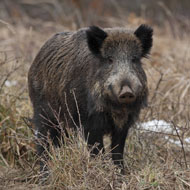Hungary reports first case of African swine fever

African swine fever was detected in a wild boar in the Heves region.
African swine fever has been detected in a wild boar in Hungary for the first time, government officials have confirmed.
While the source of the infection has not been confirmed, the most likely cause is thought to be food waste introduced by foreign citizens working in industrial facilities in the area, according to an alert by the World Organisation for Animal Health.
Over the past two years, dead wild boar have been monitored for ASF in the eastern counties near the borders with the Ukraine and Poland. Hungary began border checks for pork and pork products, as well as increased passive surveillance in the rest of the country last year.
The Animal and Plant Health Agency (APHA) said the case is worrying as it was detected in the Heves region, outside of the country’s surveillance zone.
Anna Williamson, APHA’s pig veterinary lead, is quoted by the National Pig Association as saying: “This is concerning as it means that either infection in wild boar nearer the border has been missed or that the case results from other means of transmission, such as illegal movement of infected pigs or feeding of infected pork/pork products, as was suspected to be the case for the geographical jump to the Czech Republic in 2017.”
NPA’s chief executive, Zoe Davies, added: "ASF is a real threat to the UK. This discovery reinforces once again the need for vigilance when it comes biosecurity on farms, particularly in cases where visitors or workers come from high risk areas of Europe.
“We continue to remind all pig keepers that it is illegal to feed food waste to pigs, as this is one most likely routes for infection to reach the UK pig herd.
"We also continue to call for measure to ensure our own feral pig populations, particularly in the Forest of Dean, are kept under control. If the virus ever gets into our feral pig population, it could take years before we are able to free ourselves from crippling export restrictions."



 The Federation of Independent Veterinary Practices (FIVP) has announced a third season of its podcast, Practice Matters.
The Federation of Independent Veterinary Practices (FIVP) has announced a third season of its podcast, Practice Matters.